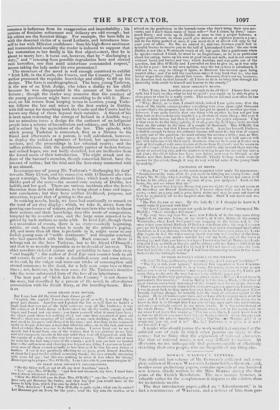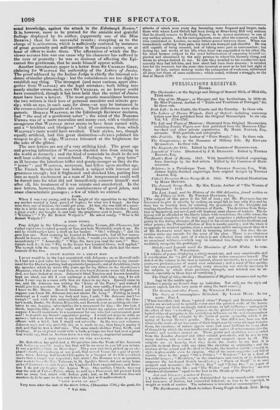ACE W v Lroi.E s LET TER S.
TnE sixth and last volume of Mr. Ih.srt.r.v's collected and com- plete edition of I lo It ACE NVtt Eu )1.E.S Letters finishes the work ; and, besides some preliminary papers. contztins upwards of one hundred. new letters, chiefly written tel the Miss Burtuys during the first. years of the French Revolution. Th: new matter. however, is valuable rather for the completeness it imparts to the edition, than for its intrinsic merits.
'I' he first introductory paper. called an " Advertisement," is in fact a 1C111 illiSCCHCC WALrot.r, and a defeeee of him, from per- fond knowledge, against the attack in the Edinburgh Review.* ft is, however, more to be praised for the amiable and grateful
feelings displayed by its author, (apparently one of the Miss
BERRYS,) than for its successful results ; excepting as to the charge of hcartlessness, which is sufficiently confuted by instances of great generosity and self-sacrifice in WALPOLE'S career, or at least of offers to make them. The affectation of which the Re- viewer accuses him was one cause why his character has suffered in the eyes of posterity : he was so desirous of affecting the Epi- curean fine gentleman, that he made himself appear selfish. Another introductory paper is a letter from Sir CHARLES GREY, claiming for WALPOLE the authorship of the Letters of Junius. The proof adduced by the Indian Judge is chiefly the internal evi- dence ofsimilar phraseology : but the coincidences are too slight to establish any thing. The strongest (and most curious, apart alto- gether from WALPOLE) are the legal mistakes; both falling into aearly similar errors,.such, says Sir CHARLES, as no lawyer could have committed, though it has been held that the writer of Junius must have been a lawyer. The most generic resemblance between the two writers is their love of personal anecdote and minute gos- sip; with an eye, in each case, for dress—as may be instanced in the cream-coloured parasite of JUNIUS. Their differences were also generic. floaAcE: WALPOLE, as the Edinburgh Reviewer declares, had " the soul of a gentleman usher" ; the mind of the NOMINIS 3.3'smaA was of a more masculine and massy cast, with a vindictive savageness that WALPOLE never seems to have been cursed with, and a " brickbat and bludgeon" kind of coarseness, from which WALPOLE'S taste would have revolted. Their styles, too, though equally artificial, had this great distinction—Jumus polished his weapon to give it edge, WALPOLE laboured at the brightness for the sake of the glitter. The new letters are not of a very striking kind. The great age and growing infirmities of WALPOLE disabled him from mixing in the world as formerly ; and the kind of materials he dealt in do not well bear collecting at second-hand. Perhaps, too, " gray hairs" as ill become the laborious trifler and gossip-monger as they do the " jester" : and WALPOLE, moreover, had fallen upon another age. The French Revoluion was indeed a subject with interest and greatness enough ; but it frightened and shocked him, putting him into as much excitement as a man of his temperament could well be forced into for what did not immediately concern himself: and after all, his treatment of it was minute and anecdotical. In the new letters, however, there are reminiscences of good jokes, and some characteristic passages; a few of which we extract.
FAME.
When I was very young, and in the height of the opposition to my father, my mother wanted a large parcel of bugles; for what use I forget. As they were then out of fashion, she could get none. At last, she was told of a quan- tity in a little shop in an obscure alley in the City. We drove thither ; found a great stock ; she bought it, and bade theproprietor send it home. Ile said, " Whither ? " To Sir Robert Walpole's." He asked coolly, "Who is Sir Robert Walpole ? "
A 0001) STORY.
Pray delight in the following story. Caroline Vernan„fille d'honneur, lost Vother night two hundred pounds at faro, and bade Martindale mark it up. He said he would rather have a draft on her banker. " Oh ! willingly ; " and she gave him one. Next mooning he hurried to Drummond's, lest all her money should be drawn out. " Sir," said the clerk, "would you receive the contents immediately ? " "Assuredly." "Why, Sir, have you read the note ?" Mar- tindale took it : it was " Pay to the bearer two hundred blows, well applied." The nymph tells the story herself; and yet I think the clerk had the more humour of the two.
A PETIT MAITRE ON A GREAT MAN.
I never would be in the least acquainted with Johnson ; or, as Boswell calls it, I had not a just value for him : which the biographer imputes to my resent- ment for the Doctor's patting had arguments (purposely, out ofJacohitism,) into the speeches which he wrote fifty years ago for my fattier, in the Gentleman's Magazine, whirls I did not read then, or ever knew Johnson wrote till Johnson died, nor have looked at since. Johnson's blind Toryism and known brutality kept me aloof, nor did I ever exchange a syllable with him ; nay, I do not think I ever was in a room with him six times in my days. Boswell came to me, said Dr. Johnson was writing the "Lives of the Poets," and wished I would give him anecdotes of Mr. Gray. I said, very coldly, I had given what I knew to Mr. Mason. Boswell hummed and hawed, and then dropped, " suppose you know Dr. Johnson does not admire Mr. Gray." Putting as much contempt as I could into my look and tone, J. said, " Dr. Johnson don't !— humph ! " and with that monosyllable ended our interview. After the Doc- tor's death, Burke, Sir Joshua Reynolds, and Boswell, sent an ambling circular letter to me, begging subscriptions for a monument for him : the two last, I think, impertinently, as they could not but know my opinion, and could not suppose I would contribute to a monument for one who had endeavoured, poor soul ! to degrade my friend's superlative poetry. I would not deign to write an answer ; but sent down word by my footman, as I would have done to parish- officers with a brief, that I would not subscribe. In the two imew volumes, Johnson says, and very probably did, or is made to say, that Gray's poetry is dull, and that he was a dull man. The same oracle dislikes Prim;, Swift, and Fielding. If an elephant could write a book, perhaps one that had read a great deal would say, that an Arabian horse is a very clumsy, ungraceful animal.
A FINE GENTLEMAN ON TILE ANCIENTS.
Dr. Robertson has published a Disquisition into the Trade of the Ancients with India—a sea '1wock ; but that will be no news to you till you return. It was a peddlitg i raI i those days. They now and then picked up an ele- phant's-tooth, or a ri at iiim•g, pearl, that served Venus for a pair of pend - ants, when Antony had toasted Cleopatra in a bumper of its fellow—which shows that a commie wit4 imported.; but, Mack ! the Romans were so ignorant, that waiters from the Tres Taiwan., in St. Apollo's Street, did not carry home sacks of diamond, enaugh to have the Capitol—I lute exaggerations, and there- fore I do not say to pave the Appian Way. One author, I think, does say that the wife of FalmimIs Pictor, whom he soli! to a Proconsul, did present Livia with an ivery feel, inlaid with Indian gold; but, ale Dr. Robertson does not mention it, to be sure he does not believe the fact well-authenticated.
" LAST SCENE OF
Very soon after the date of the above letter, (December 17960 the gout, the attacks of which were every day becoming more frequent and longer, made those with whom Lord Orford had been living at Strawberry Hill very anxious that he should remove to Berkeley Square, to be nearer assistance in ease of any sudden seizure. As his correspondents, soon after his removal, were like- wise established in London, no more letters passed between them. When not immediately suffering from pain, his mind, was tranquil and cheerful. He was still capable of being amused, and of taking some part in conversation ; but during the last weeks of his life, when fever was superadded to his other ills, his mind became subject to the cruel hallucination of supposing himself ne- glected and abandoned by the only persons to whomellis memory 'clung, and whom he always desired to see. In vain they recalled to his recollection how recently they had left him, and how short had been their absence : it satisfied him for the moment, but the same idea recurred as soon as he had lost sight of them. At last, nature sinking uuder the exhaustion of weakness, obliterated all ideas but those of mere existence; which ended, without a struggle, on the 2nd of March 1797,



























 Previous page
Previous page